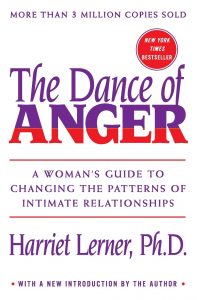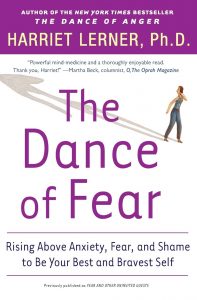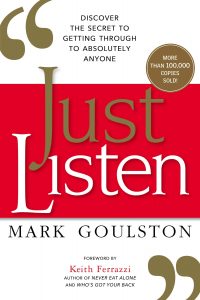In this Episode
- [00:40]Stephan introduces Harriet Lerner, Ph. D., one of our nation’s most loved and respected relationship experts. She is the author of numerous scholarly articles on the psychology of women and family relationships and the author of 12 books.
- [06:15]Harriet explains how women usually deal with their anger and how this affects them in the long run.
- [12:14]The four words that can bring a relationship downhill according to Harriet. She also shares an example of a small change that makes a big difference in the relationship.
- [18:06]Harriet asked Stephan on his understanding of defensiveness in a relationship.
- [24:27]Harriet talks about the greatest gift that you can give to your partner and yourself.
- [30:58]Why is it important for people in a relationship to share and respect each other’s differences?
- [36:32]Harriet describes her process in helping couples deal with their relationship.
- [42:14]Stephan points out the two things you need to have in recognizing patterns and working out a relationship.
- [49:31]Harriet tells an interesting story of how she helped a patient of hers communicate better with her mother to resolve an issue.
- [54:17]Visit Harriet Lerner’s website, harrietlerner.com, to check out her books and blogs and learn more steps in the dance of relationships.
Harriet, it’s so great to have you on the show.
It’s great to be on the show.
So you have been prolific with your writings, and how many books do you have now?
Twelve.
Twelve, that’s amazing. And what has inspired you to write so many books?
Most of them are about relationships, and relationships have always fascinated me. I decided to become a clinical psychologist before I entered kindergarten, and I never veered from that goal. So, relationships are so difficult, and they are supposed to be the source of our greatest comfort, and they are, they’re also the source of distance and intensity and anger and pain and just plain hard times. So what motivates me is wanting to help people with relationships.
Right. And is there one book in particular, that is the standout book for helping people with relationships? Or is that kind of spread across all your books?

The standout book is The Dance of Anger, the first book, which was rejected for five years by every publisher on the planet. And a moment of silence or my perseverance or stubbornness, I wrote it on a typewriter, which is an amazing thing to do, I can’t imagine now. So that book, which was rejected multiple times, has gone on to sell over three million copies and continues to fly off the shelves. So I would say that’s the standout book.
Amazing. Congratulations on your success. That is wonderful, and you’ve revealed so much light in the world through your writings and your guidance. I’m curious, is there a particular event or a turning point in your life that brought that particular book into reality?
As a therapist, I was seeing so many women in particular, who were coming in with all kinds of symptoms and complaints, whether depression or anxiety or very low self-worth. And underneath so many of the problems were difficulties with anger. And women were managing their anger into basically dysfunctional ways. The working title for The Dance of Anger was Nice Ladies and Bitches; A Woman’s Guide to Anger, but that title was vetoed by my publisher and turned into The Dance of Anger. So the women that I saw in therapy and life were either nice ladies in the sense that they accommodated, they didn’t rock the boat, and they avoided anger and conflict at all cost. Or in the other category, women were engaged in endless cycles of fighting and blaming that led nowhere or even made things worse. So I wanted to help women and also men. Humans are more alike in the way we get in trouble than different, but to help readers to use anger from a position of power and strength, to use anger to define who we are, this is who I am, this is what I think, this is what I believe, this is the ground I walk in, and to use anger to take a new position on their behalf rather than dissipating their anger energy and either avoiding conflict or fighting in ways that only made things worse.

So there are two ways that women deal with their anger. One is they completely avoid it, and the other is they just kind of give way to it and let it control them, is that accurate?
That’s accurate. Although the woman who is culturally described as a nice lady looks very different from the woman who gets called a bitch, they’re different sides of the same coin. Whichever style we have, and we often can’t have both styles depending on the circumstance, but in the end, the woman is left feeling helpless and powerless. And in the end, nothing changes because fighting ineffectively will protect the status quo as surely as when we just can’t fight it all. So the styles look very different, but the outcome is that nothing changes.
Would you say that crazymaking might be part of the outcome if the cycle isn’t broken? So crazymaking or gaslighting is something that’s been discussed more in recent times than in the past, I think. And my understanding of that is when the man and the relationship deny their partner’s reality makes them feel like they’re crazy like they don’t know what’s real and maybe they imagined that, and maybe that person isn’t doing these things after all. Is that something that you have seen quite a lot in marriages and couples?
That certainly happens that one person mystifies the other person’s reality and turns what they say into something scrambled. So that one person is not heard or reflected accurately. Just putting it a lot more simply, when we’re stuck in too much distance, or we’re stuck in too much fighting, it’s just very painful, it’s not what anyone wants. For example, when couples come to see me for help, they want to change, they genuinely want a better relationship, but they secretly want me to change their partner, they secretly are hoping that I’m going to fix up their partner. And change only happens when I can get one person to get more self-focused, and put their energy into observing and clarifying and changing their steps in the dance. Self-focus doesn’t mean self-blaming. It simply means that our part of the pattern that’s bringing us pain, even if we’re convinced that our part is only 2% is the only part that we can change. So until I can get one person to calm down enough and think rather than react and to have the motivation to be the one to change first, even if the other person is behaving like a big jerk, that’s when change can occur.
Relationships are difficult. They are the source of our greatest comfort, yet they can be the source of distance, intensity, anger, and pain. Click To TweetRight. And I would imagine that when one person changes, that changes the dynamic of the relationship, and variably, the other person will change too, I would imagine.
Exactly. That is good news. The difficult news is that change is very difficult, and the good news is that even a small change on the part of one person, they stopped distancing, they stopped pursuing, they stopped enabling, they can warm things up and make things more positive. Sometimes a very small change will make a very big difference in a relationship if you can maintain that change over time.
And what would be an example of a small change that one person can make that will change the whole relationship and eventually, the other person too? It could be as simple as biting your tongue when you want to say something reactive, taking a deep breath for five seconds, and then saying something. But I don’t know, I just made that one up, so you tell me what would be an example or two of a change that could make a profound difference in the relationship.
Sometimes a very small change will make a very big difference in a relationship if you can maintain that change over time.
I think those are excellent examples. For example, something that will warm things up or speak to the positive, say a couple, or a relationship that is just drowning in negativity. You know, it’s very interesting, speaking about couples, for example, when couples first get together, they know how to make each other feel valued, special, appreciated and chosen, and they automatically pay attention to what they’d like in the person. They automatically pay attention to the positive, and they comment on that. The longer people are coupled up, the longer they’re together, the more that selective attention reverses.
So we automatically pay attention to what we’re critical about, and we voice that. And it can be little things like, “Why are you putting so much water in the pot for the pasta?” and “That’s not the right knife to cut the tomato,” and “What’s wrong with you?” By the way, those four words, “What’s wrong with you?” are terrific words to bring a relationship right downhill at the moment. An example of a small change would be that one person would begin to notice and comment on maybe a small, positive thing, like, “I heard you on the phone with your brother, and I loved the way that you used humor to deal with him.” Dialing down the criticism because many folks value criticism at the early stage of a relationship, but become more allergic to it over time. Practice noticing the positive and commenting on the positive, that would be an example of a small change makes a very big difference. If someone practices, say having a ratio of two positive comments to every five criticisms, even that could be a huge change.

That makes a lot of sense. I’ve heard similar sorts of ideas from like Dr. Gottman talks about the Four Horsemen of the Apocalypse, criticism being one of them, there’s contempt stonewalling and defensiveness. Avoiding those four horsemen will help keep your relationship alive, and also interviewed Harville Hendrix and Helen LaKelly Hunt.
Oh, their friends of mine.
They’re amazing. And one thing that just floored me when I interviewed them several years ago, and listeners, by the way, definitely you must listen to that episode, it’s amazing. The thing that struck me, it was full of so much wisdom and life experience and tools. It was fantastic. But the one thing that stuck and changed my life was the daily appreciations. I had heard them present workshops before, but what I could not believe they shared during their interview with me was they gave each other a daily appreciation without fail for 18 years. They didn’t miss a day.
As they’re like the last thing, they say to each other before going to sleep instead of “Oh, can you remember to pick up the milk or whatever tomorrow?,” it’s at least three things that I appreciate about you. And it’s just heartwarming and its rapport building, and it’s loving, and it’s connected. My wife and I have been doing it not quite without fail, but almost every night. I think we may miss a few nights a month, but for the most part, we get it every night like we did last night, and it makes such a difference. It’s just beautiful. And so I took that on board if they can do it without fail for 18 years, every single night, we can do it 98% of the time.
Humans are more alike than different in the way we get in trouble and deal with negative emotions. Click To TweetThat’s wonderful. It’s also important that they have made it into a practice, an actual practice, which is what you’re saying that you’re also doing with your wife. And what I would add to that is that speaking of focusing on the positive is that God is in the details. And what I mean by that is that it’s very useful to focus on the specific things that you value about your partner, which is different from “I love you,” and “You’re the greatest.” And with children, it’s not enough to say, “I love you,” “You’re such a great kid,” and “You’re the greatest.” We need to say specific things like, “I’m so impressed that you were so brave to tell your friend how you felt when you weren’t invited to the party,” or “What a great job you did by setting the table.” And we forget that other people, including our partners, need that, they need to hear the specific things like, “I was impressed when your dad got on his political thing, you just beautifully and lightly,” we’re able to say how you see things differently, that, “It’s fantastic when you did that.” So this is an important one that we’re talking about for a better relationship, to warm things up, to speak to the positive, to make it a practice to remember that God is in the details.
The other thing you mentioned, Stephan, I think we should talk about because it’s so important, is defensiveness. Defensiveness is the archenemy of the intimacy of any relationship. And we are wired for defensiveness when we don’t want to hear what the other person is saying. I mean, we don’t get defensive when the other person wants to tell us how beautiful and brilliant and wonderful we are. Often they have a criticism, and often they want to talk about something that we just can’t stand hearing about anymore. And I’m wondering, Stephan, since you’ve thought about these things, do you have any thoughts about defensiveness or what’s your understanding of what it is?
We are wired for defensiveness when we don’t want to hear what the other person is saying.
Yeah, that’s great.
I’m putting you on the spot.
I like it. Okay, so my understanding of defensiveness is that you have a position that you’re trying to defend. And when you are trying to defend yourself, your position, your point of view, your way of life, behavior pattern, or whatever, you can either be right or be loving. And it’s kind of a bad binary choice, in my opinion. So if you’re going to be right or self-righteous and defensive about your position, then you’ve shut off love. And that’s not something I came up with myself, I learned this from Kabbalah classes, but it resonates for me. So I try to get off my high horse, be humble, take the medicine, and whatever the feedback my wife has for me. Sometimes I’m not so good at it, she can certainly testify to that, but it’s something that I kind of keep in mind and the better I am at that, the better the relationship.
That’s perfect, you should be sitting in my chair. And I would add to it, because it’s what you’ve mentioned, it’s tied to how we listen to the other person, how we sort of whether we have an open heart and really can listen even to what we don’t want to hear. And I would add to that, that we are wired for defensiveness, we can’t always put it on a shelf. And it’s very useful to be able to recognize when we are listening defensively because we automatically will. And when we listen defensively, we’re listening to the exaggerations, the distortions, and the inaccuracies, which will inevitably be there. If you pay attention when your partner says we have to talk, that we are listening for the part, we don’t agree with. So then we can correct the other person, we can get up on our high horse as you say, and we can make our case, and we can bring up their crime feet. And it’s the most difficult human task to listen to what we don’t want to hear with an open heart. It requires us to quiet our minds and slow down our breathing and enter a difficult conversation, knowing that we will only listen and ask questions, to better understand what, for example, our partner wants us to get the essence of what they’re saying. It requires us to stop ourselves from interrupting, correcting facts, counter punching, or saying anything that will leave the other person feeling unheard. Or cut short or misunderstood or gaslighted, to use a term that you brought in earlier.

And I have a little confession here, there’s one thing that triggers my wife, Orion, and I still do it, and I’m trying to not do that. But when we’re in an argument or disagreement about something, if I correct her English, she’s not a native English speaker. Her first language is Hebrew. She’s excellent at English, I mean, if you listen to her podcasts, you would never think like, “Oh, she’s not an English speaker.” But I correct her English sometimes when we’re in an argument or disagreement, and that just drives her nuts. And I would be upset too if I were in her position. And I need to stop myself, and I don’t always do that, so yeah. Not a great trait on my part, poke the bear, correct somebody’s English when they’re trying to get their point across that they’re upset with something that I’ve done or said. Don’t do that.
Right. Hebrew, by the way, is my husband’s second language.
Oh, very cool. It’s a beautiful language, and I’ve learned a little bit of it. I’ve got a long way to go. We’ve got an eight-month-old who’s gonna be fluent because he hears it every day. So that’s amazing.
How we talk and how we listen shapes how our relationships go.
There is no greater gift than raising a child bilingual because it’s hard to learn a language later on.
Yeah. And it does something to their brain and in a very positive way, especially when they’re very young and they’ve got maximum neuroplasticity. It’s a great gift.
Exactly. It’s fabulous. So, in terms of listening, I think it’s one of the greatest gifts that we can give to our partner or the other person and, ultimately, ourselves. If only we could listen with the same passion that we feel about being heard, but that doesn’t come naturally. You know, it’s so interesting to me, Stephan, that how we talk and how we listen, shapes how our relationships go. And if the other person is happy to see us at the end of the day, and people are motivated about that talking part. They want to get through to their partner. People are very motivated to enhance their talking skills and much less motivated to attend to the other half of the conversational equation. And I know that because I used to give classes where I was living and working in Topeka, Kansas to a colleague and myself gates classes to open to the community, all talking straight and fighting there. And people were just actually banging on the doors to get into these classes. I decided to do the same course but on listening, and I called it the Art of Listening. And I had to cancel that one-day seminar because four people signed out, and it might have been partly my problem back then I didn’t know much about marketing. And probably instead of calling it the Art of Listening, I should have called it something like The Four Secret Tricks to Listening that will make the universe give you everything you want or some sexy title.
It's okay to fight but fight effectively. This means you go into battle for the sole purpose of making things right again. Click To TweetYeah, like one of the headlines you might see on a BuzzFeed article.
Exactly. But anyway, it’s interesting how people are so much more interested in the talking part because there is nothing as important in determining how a relationship goes, then our capacity to put our defensiveness aside to listen, not to find the errors, but to get the essence of what our partner wants us to hear. And to be able to say, “Is there more you haven’t told me? Do I have this right?” That is the greatest spiritual gift that we can give to another person. And we’re not going to do it all the time. We can’t do it all the time. As I said, we’re wired for defensiveness, and when we’re anxious, and when our nervous system is on fire, and when we’re angry and twitchy and agitated, it is impossible to listen well. So it’s something we practice.
Right. And if there’s a framework or some process that helps us with that, I would imagine that would be a good thing.
Well, the first part of the process is that you need to calm yourself down. Because nobody can listen with an open mind during open-heart unless they can get a grip on their intensity and their reactivity, so that may be important to say to a partner, “I can’t listen well now, I’m just feeling so flooded. Let’s reschedule this conversation because what you’re saying is important. I want to be there for you for this conversation, but I can’t have it right now. I can’t have it in this way.” So calming ourselves down is important.
Another thing that helps people with listening is if they think in terms of two conversations because people tend to think that we have to do everything in one conversation, we have to make all of our points. If you can think in terms of two conversations, you can enter the conversation, number one, with the intention that you’re only going to listen, to understand you’re only going to try to apologize and get that piece that you can wrap your brain around and apologize for that first. And then when your partner and it could be your mother or your sister feels heard because you have engaged and open-hearted listening they feel heard, then you can say, because it’s no longer a defense strategy, it’s the important process of being able to define your differences.
At the heart of a good relationship is the ability to share and respect differences.
So then you can come back and say, “I was thinking about our conversation. I’m so glad you brought up how I kept correcting your stories at the party. I’ve been thinking a lot about what you told me, it was wrong. I want to say again. I’m sorry. But there was one piece that I see differently. And I want to share that with you. While I am responsible for the way that I was correcting your stories, totally obnoxious. I do not take responsibility for the fact that you are overdrinking at the party. My behavior is my responsibility, and the fact that you responded by overdrinking, as I see it, is your responsibility.” And this is a very important point to make Stephan, because while it’s so important to listen, it’s so important to not counterpunch, to not bring up the other person’s crime sheet, when they have gathered the courage to confront us, we also do need to share how we see it differently. We do need to be able to say, “I was thinking about the conversation, this is the piece I don’t agree with, and let me tell you how I see it differently.” And that capacity to say, “this is what I think, this is how I feel, this is what I see differently,” without having to change or fix up your partner, which is impossible. That is also at the heart of a good relationship, the ability to share and respect differences.
Yes. And if you are not wanting to rock the boat, so you don’t raise your concern about the situation, then that denies an opportunity for your partner to learn and to grow.
Exactly. And it denies yourself because we de-self ourselves, we lose self when we’re not able to say what we think and feel about things that matter. If you look at a mature relationship, people do not need to express every grievance that comes along. You don’t need to comment on every little irritating thing about your sister or your partner, like how they hold their spoon or whatever, but when something matters, we do need to speak to it, and that is what it means to have a self. And when we’re so afraid of conflict and difference that we’re just accommodating because we don’t want to rock the boat and we don’t want to say anything that might bring anger or disapproval from the other person. We lose ourselves, we get de-selfed, as I call it in The Dance of Anger. And then we become vulnerable to developing any kind of symptom, like depression or you name it.
It seems like de-selfing is kind of like denying your reality, so as denying your partner’s reality.
Exactly.

And one thing that you had said earlier that people are much more interested in learning how to get their point across better than to listen better. And it just occurred to me there is a book by Mark Goulston, who was also a past guest on this podcast, and a friend of mine, it was a great episode. But he authored a book called Just Listen. And it did sell, by the way, several copies, like a hundred plus thousand copies, but I think he did something very clever. He created a subtitle to it, called Discover the Secret to Getting Through to Absolutely Anyone, so it’s still getting the other side of the coin there. The person wanting to get their point across like, okay, I want to learn how to listen in a strategic way so that I can change their mind or change my partner, or the other person I’m talking to.
I have a parallel to that, my most recent book, which is a book about apologizing, so essential in relationships, to be able to heal the hurts that we receive, and my publisher wanted to call it the Art of Apology, which I knew would never sell a book. So the title is, Why Won’t You Apologize? Which sells very well, because people bought it for their partners.

Yeah, that does kind of like a Trojan horse. Very clever.
Exactly. Well, I’ve learned.
So you’re a marketer.
Right, one has to be.
So this listening process of calming yourself down first and thinking into conversations and not denying your eality, not de-selfing yourself, all this, that’s in The Dance of Anger. Is that a process that has a checklist? I’m thinking for parallel purposes, the Imago Dialogue, from Harville Hendrix and Helen LaKelly Hunt, which has a very set process with steps, and there’s a lot of structure to it. Now, my wife and I have done Imago Dialogues, and it’s been great to do that, we don’t do that currently, I don’t know, it feels a little stilted. But maybe we’re just not in the habit of it anymore. But it’s just not something we naturally do, that doesn’t feel natural to us, and we don’t do it. But we probably would be in fewer disagreements or arguments if we did. Is there an equivalent to the Imago Dialogue from The Dance of Anger, or some sort of stepwise checklist type of process?
My way of teaching and my way of learning is much less structured than that. As we’re talking about, I certainly one could make a list for sure of what I see as the challenges, whether it’s a couple, whether it’s a mother-daughter, the challenge is to move out of relationships characterized by too much distance, too much intensity, and too much blame. There would be specific ways to help people warm things up, dial down the criticism, calm themselves down, stop being so defensive, listen, have more self- compassion, fight fair, and avoid below the belt techniques. Interestingly, The Dance of Anger, while that’s all there, it’s more about seeing the patterns that get us into trouble. The pursuer and the distancer, the overfunctioner and the underfunctioner see our part in the patterns that cause us pain and help people change their steps in the dance. So the way that I work is quite different from how they work, which is good because people are different. So they need different books and different chemistry, the relationship that gets set up between an author and the reader.

Yeah, that’s very interesting. I love the concept of being a better pattern recognizer. So if you can identify the patterns that are in your life and your relationship and your partner, as well as yourself, and then you can utilize that knowledge to diffuse arguments before they even happen, and understanding kind of how each of your ticks, that seems kind of like a superpower to me.
It’s a superpower if you can observe the pattern that you’re both engaged in. And rather than trying to fix the other person, you can modify your part in the pattern and give you a great example of that. For example, let’s take the nagging, pursuing wife and the distancing husband because many couples operate true to that stereotype. So for example, I have on film in terms of supervising or teaching students, a film of a nagging wife, she knows sooner her husband enter the door, and she goes at him in a rat-a-tat-tat way, wanting to talk about this and wanting to talk about her concern about little Johnny and so she is the pursuer, and that is her very entrenched style. When anxiety hits and stress hits, her style is to pursue and want to talk about it. Her style is to overclock it. His style is exactly the opposite. He’s more a distancer. So if we look at what he is doing, he’s stonewalling her, he’s not listening to her, he’s looking at his phone, he’s not available for conversation, he’s removed himself from that.
Now, there’s nothing wrong with either style, and it’s the dance they got into. So the more she pursues, the more he distances, and the more he distances, the more she pursues. And each style reinforces and augments the style of the other. So, Stephan, I’m showing this film that illustrates this to let’s say, 50 students, 25 of them, and I’m asking the question of, who’s causing this problem? So I would say half of the students will say, she is causing it, this impossible wife, and the poor guy, on the receiving end of this intense rat-a-tat-tat pursuit. Of course, he distances, it’s on this phone, poor guy. The other half of the students, this may break down on gender, say the other half maybe women may say, you got it all wrong, because first, this guy distanced, he distanced into work, he became unavailable to her. Her anxiety about the disconnection got higher, of course, she pursues, but he started it. So what I want to help people with, whether it’s my patients or a teaching therapist, doesn’t matter who started it. It doesn’t matter who is to blame. What matters is whether I can help one of these two people change their automatic style. It doesn’t matter. I could have one of them in therapy. It only takes one if I have her in therapy, I’m going to invite her to experiment with modifying, that rat-a-tat-tat, over talking style, because he just gets flooded.
God is in the details. Really, no matter how cliche it is, it's always the little things when it comes to relationships. Click To TweetAnd if I were working with him, I would help him modify his distancing pattern and stonewalling pattern. I would help him be able to say to her because he just decided that she’s impossible. And that’s that, and there’s nothing he can do, but being married to his phone and sort of tried to turn her out, and I would help him to talk to her about what he needs from her so that he can listen better. I’m gonna help him be able to say to her, “I’m your partner, and I do want to listen to you and your concerns about little Johnny, but I can’t listen in this way. So, let’s set up a time, like Sunday, after while we’re having coffee, where you can talk to me about all the things that are bothering you. And I am going to make the biggest effort to do nothing but listen.” So it doesn’t matter in these patterns, which I have in my consulting room, I’m happy to just have one who has their motor running for a change, that is changing themselves, not fixing their partner.
So they’ve got to have two things, they have to have a desire to fix the relationship or improve it, and then they have to have the understanding that the change has got to come from within.

Exactly. That the only person that can change is their own self, and, yeah, the first thing you mentioned is very important because nothing’s going to change if one person doesn’t have the genuine motivation to have a better relationship, and also the maturity to be willing to experiment with being their best self, even if the other person is being a big jerk. Because they’re our automatic tendency to want to throw fuel on the fire. And one other thing that we haven’t talked about, although we’ve touched on it indirectly, is that a good relationship requires a profound respect for differences. Like that pattern that I described, that’s merely a difference. That her way is to want to process talk about it his way. He was more of you do it yourselfer, he needed a lot of space. That’s what threw them to each other, but what draws us to our partner is exactly what makes us crazy later on. But relationships require profound respect for differences. So I always help couples to lighten up about differences because we all see the world through different filters. The filter of our gender, birth order, cultural differences, DNA, family history, and differences doesn’t mean that one person is right, and another person is wrong. And I have a great cartoon up in my consulting room, and it shows a dog, and a cat in bed together and the dog is looking morose, and he’s reading a book called The Dog Who Love Too Much. And the cat is saying, “I’m not distancing, I’m a cat, dammit!” And it’s just a wonderful cartoon because people do so much better in relationships when they can appreciate and respect differences.
And those are two different things, actually respecting differences and appreciating differences, I think are kind of two different levels, like energetically, appreciation, I think is a higher level of what you’re describing.
Exactly, I agree, and we’re not always going to appreciate differences. Some differences do not make us anxious, angry, and agitated. Like, for example, I like vanilla ice cream, and you like strawberry, it’s not going to be a problem. But some differences arise between us, especially in this polarized age, where we’re not going to appreciate that difference. We can learn to be curious about it, and we can learn to respect people’s right to see things differently. We might also need to say that difference is very hard for me, and this is why. So, yes, it’s a really good point to appreciate differences, and that’s easier if it’s another culture we’re talking about, rather than someone living under the same roof. Appreciating differences is different energetically and what it will look like, rather than when we don’t appreciate the difference at all. We can learn to treat it respectfully and do our best to be curious about it.
People do so much better in relationships when they can appreciate and respect differences.
And then curiosity, I think, is a great way to describe it. If somebody is thinking, “Well, I’m just going to tolerate this person’s differences,” that is on a lower energetic level, and it’s less respectful in my view. Then being just respectful of somebody’s differences, respecting those differences, appreciating the differences. Both of those are, in my view, superior to tolerating your partner’s differences.
Exactly. And being curious It’s one of the highest forms of respect for differences. And, when you were saying what you just said, which I entirely agree with, I thought of an interaction between a mother and a daughter, I was working in therapy with the daughter for a long time. And when the daughter told the mother that she was in therapy with me, and in any conversation where therapy came up, the mother would be very reactive and would tell her that therapy was not a good thing, and that she should go to church instead, and that she should pray to Jesus, and they would sort of fight, and it would get very polarized. And I help the daughter, be curious about the mother’s perspective, how the church should help the mother, what the mother was recommending had been helpful to the mother, and where the mothers’ ideas came from about therapy. Did she know anyone in therapy?
The daughter was rather than being reactive, and jumping on the mother was able to express genuine curiosity about the mother’s terrible views about therapy. And what she learned which she didn’t know is that her grandmother, the mother’s mother, had serious depression, had been hospitalized in some very substandard hospital and had been over medicated, and basically, it was tragic. It was the worst treatment, and the mother was worse off for having psychiatric treatment than having no treatment at all. And when the daughter was able to be curious, and then really more empathic and more understanding, she was able to make a shift. So when that conversation came up, she was able to say, “I understand that every time you tell me to quit therapy, that you’re coming from such a loving place, because psychiatric treatment was such a disaster, and I respect how you think and feel. And I can only say that for me, luckily, that my experience in therapy, it’s much different.” So that really is an example of what you were saying, Stephan, about appreciating a difference, and the curiosity, the curiosity and learning to ask good questions is essential, and coming to an appreciation of the difference rather than just, “Oh god, I have to tolerate this.”
Defensiveness is the archenemy of intimacy and relationships. Click To TweetThat was a beautiful example, and I just love that. And it reminded me of an example in my life, that there’s always more to the story. And if you’re curious if you are open, and not in a place of righteousness, that you can learn what that story is, and get that deeper, broader perspective. And the example I have is, I’ve shared this before on my podcast, but we used to have a neighbor who lived above us. He would blast music at different times of the day, and I try to record podcast interviews and stuff, and it caused a lot of conflicts. I called the cops on him, and then he would kind of go to war with my wife and me by banging on our ceiling in the middle of the night to wake us up as punishment for having called the cops on them then we call the cops on them again, it would just escalate, it was awful.
So at one point, I was in the elevator with him instead of getting out of the elevator, which I would have done normally, I had gotten some advice from my Kabbalah teacher to send him light which I had done and prayed for him. So I was in a different place when I saw him, and he came into the elevator. I told him I was sorry, I called the cops on him, and he said he appreciated that and he has PTSD from a murder attempt, somebody tried to kill him. And so he had PTSD, and that’s how he would deal with it when he was having an attack, he would turn on the music loud. And the problem went away, he stopped doing that, and we stopped having this tension. And it’s all because I was willing to apologize and just be open. So that’s pretty cool. So I know we’re out of time.
What a beautiful story, also about how a small change can make such a big difference, there’s not a lot you can do in an elevator.
Very true. So again, your 12 books, I’m sure, are amazing. But the one that I’m so inspired to read now is The Dance of Anger. And just the beautiful wisdom and everything that you’ve shared in this episode. They can get so much more just by reading the book, and then is there a website that we can send folks to?
Absolutely, it’s harrietlerner.com.
Okay, so thank you so much, Harriet. Thank you, listeners. I hope you got as much out of this episode as I did.
Important Links
- Harriet Learner
- Facebook – Harriet Learner
- Twitter – Harriet Learner
- Psychology Today – Harriet Learner
- The Dance of Anger
- Why Won’t You Apologize?
- The Dance of Fear
- Marriage Rules
- The Dance of Connection
- The Mother Dance
- The Dance of Intimacy
- The Dance of Deception
- Women in Therapy
- Life Preservers
- Franny B. Kranny, There’s a Bird in Your Hair!
- What’s So Terrible About Swallowing an Apple Seed?
- Food, Sex and Relationships
- Just Listen
- The Dog Who Love Too Much
- Harville Hendrix and Helen LaKelly Hunt – previous episode
- Mark Goulston – previous episode
- Dr. John Gottman
- Four Horsemen of the Apocalypse
- Imago Dialogue
Checklist of Actionable Takeaways










 About Dr. Harriet Lerner
About Dr. Harriet Lerner
Harriet Lerner, Ph.D., is one of our nation’s most loved and respected relationship experts. She is the author of numerous scholarly articles on the psychology of women and family relationships and the author of 12 books. Her books include the NYTimes bestseller The Dance of Anger which has sold over 3 million copies with over 35 foreign editions. It’s the book most recommended by therapists/counselors to their clients around the world. Lerner was a staff psychologist at The Menninger Clinic for over two decades and she is currently has a private practice in Lawrence Kansas. She lectures and consults nationally and is best known for her unique ability to rescue men and women from the swamps and quicksands of difficult relationships. Her bestselling book, The Dance of Fear, is especially relevant for today’s challenging and uncertain times.
Harriet is also an award-winning children’s book author (with her big sister); Franny B. Kranny There’s a Bird on Your Head and What’s So Terrible About Swallowing an Appleseed. She and her husband Steve (also a psychologist) live in Lawrence Kansas and have two grown sons. (children’s books regrettably out of print).
Disclaimer: The medical, fitness, psychological, mindset, lifestyle, and nutritional information provided on this website and through any materials, downloads, videos, webinars, podcasts, or emails is not intended to be a substitute for professional medical/fitness/nutritional advice, diagnoses, or treatment. Always seek the help of your physician, psychologist, psychiatrist, therapist, certified trainer, or dietitian with any questions regarding starting any new programs or treatments, or stopping any current programs or treatments. This website is for information purposes only, and the creators and editors, including Stephan Spencer, accept no liability for any injury or illness arising out of the use of the material contained herein, and make no warranty, express or implied, with respect to the contents of this website and affiliated materials.
LOVED THIS EPISODE
Please consider leaving me a review with Apple, Google or Spotify! It'll help folks discover this show and hopefully we can change more lives!
Rate and Review








 About Dr. Harriet Lerner
About Dr. Harriet Lerner











